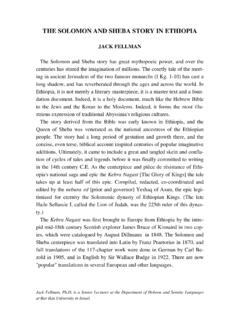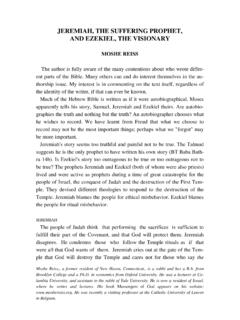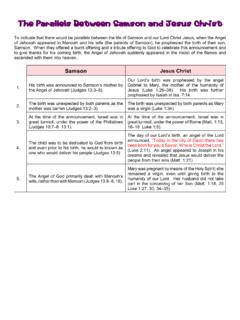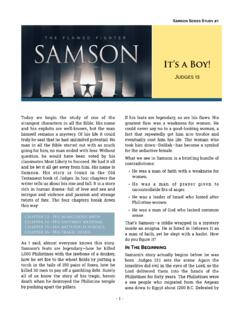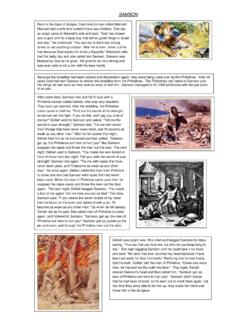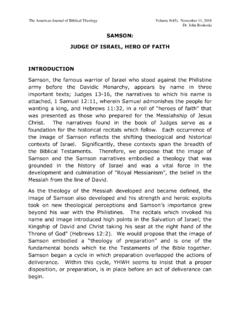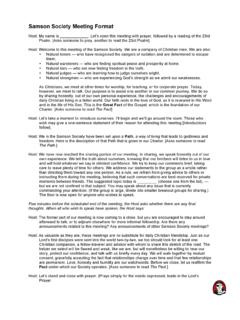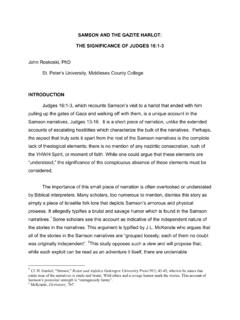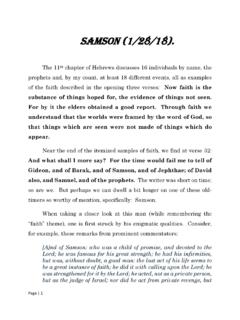Transcription of SAMSON: A TRAGEDY IN THREE ACTS - Jewish Bible Quarterly
1 Shimon Bakon, , is the editor of The Jewish Bible Quarterly samson : A TRAGEDY IN THREE acts SHIMON BAKON In contrast to Greek TRAGEDY , which has a "disastrous ending brought about by a central character impelled by fate" (Webster s definition), biblical TRAGEDY traces the unhappy ending to a flaw in the characteristics of the central character. Thus biblical TRAGEDY is close to Shakespearean TRAGEDY , where the disastrous ending is caused by "mortal weakness, psychological maladjustment or social pressures" (Webster).
2 King Saul is a classic tragic figure, and so is samson . Groomed by Providence to greatness, samson by his own weakness destroys his chances to attain greatness and also destroys himself. The story of samson , with his daring exploits and his foibles, leads to his tragic end, while his life unfolds against the background of growing Philistine mastery of territory allotted to the tribe of Dan. As an individual, selected by God to be the first to deliver Israel from the Philistines samson is equipped with supernatural strength and fatal weaknesses for Philistine women.
3 He is a nazir from the womb on, who does not understand the very nature of being a nazir, and is enmeshed in the tension between forces he did not understand. His life has a plethora of contradictions. As a "judge" he differs from the other judges. They engage in struggle to restore freedom to Israel, but samson 's actions against the Philistines are personal vengeances for "wrongs" done to him. Neither does he display any leadership, nor is it recorded that he inspires any religious renaissance.
4 The great 17th-century English poet John Milton wrote the tragic poetic drama samson Agonistes which presents samson as "the type and precursor of the Christian hero. He suffered for his people; in the very pit of despair, he was rendered suddenly capable of God's revivifying grace."1 However, the story of samson related in Chapters 13 16 of the Book of Judges can be presented as a biblical TRAGEDY in THREE acts : Promising Youth, As a Driven Leaf, Downfall. It deals with the unique personality of samson as an individual torn between Providence and freedom of choice.
5 samson : A TRAGEDY IN THREE acts Vol. 35, No. 1, 2007 35 ACT I: PROMISING YOUTH Even informed readers of the Hebrew Bible may be surprised to learn that samson is the only biblical personality burdened prenatally with the nazirite code of conduct and a sacred task. Abraham bursts upon the scene of history at the age of 75. Moses has reached the ripe age of 80 before, at the Burning Bush, he most reluctantly accepts the task of liberator. Samuel receives a Divine call as a youngster whom his mother had dedicated to the service of the Lord.
6 Of samson it is told that a messenger of God appears to the barren wife of Manoah, a woman whose name is not even mentioned, and announces that she will bear a son. She is told that she must abstain from drinking wine or any other intoxicant, and from eating anything ritually unclean. The boy will be a nazir to God from the womb on, and no razor shall touch his hair. Above all, he shall begin to deliver Israel from the Philistines (Jud. 13:2-5). Nothing is recorded of his youth.
7 All we are told is: The boy grew up and the Lord blessed him. And the spirit of the Lord began to move him in the encampments of Dan, between Zorah and Eshtaol (13:24-25). Here is the place to fill in two lacunae in the narration. Scripture is strangely silent, giving no indication in what ways the spirit of the Lord moved him. Yet, there may be some hint in the singularity of the samson narration. Throughout the Book of Judges we meet the following refrain: Israel does evil before the Lord and in His anger He delivers them to an enemy.
8 Israel repents and appeals for the Lord's help and He sends them a savior. The exception to this formula is the seeming lack of response in the samson narration when, falling back to evil ways, Israel is delivered by God into the hands of the Philistines. Perhaps we can give some credit to samson that in his youth, gripped by the spirit of the Lord, he initiated some religious revival in Israel and wreaked havoc on the Philistine invaders. It must be assumed that he did something that prompted his elevation to the position of judge.
9 The second lacuna that should be addressed refers to samson as a nazir. Was he bound to all the terms of a nazir, as was his mother, or only the one about his hair? Traditional commentators, such as Radak (David Kimchi), followed by Yehezkiel Kaufman, each for his own reasons inclined to the second alternative. Logic, however, would suggest that if his mother had SHIMON BAKON Jewish Bible Quarterly 36been commanded, in preparation for his future calling, that before his birth she must abstain from intoxicants a prime condition of nazirism and from defiling foods, this code of behavior should apply even more to samson himself.
10 ACT II: AS A DRIVEN LEAF TIMNAH Without transition, Act II begins with the seemingly innocuous report that samson went down to Timnah, where he noticed a Philistine girl whom he wished to marry. To his parents' protest Is there none among the daughters .. among all our people .. ?' samson replies: 'Get me that one, for she is the one who pleases me [literally: is right in my eyes']. There follows a significant editorial comment: His father and mother did not realize that this was the Lord's doing.
